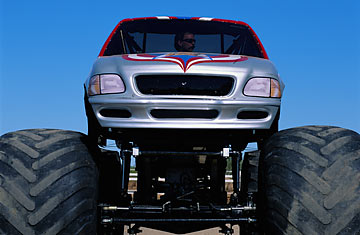
"Go big or go home" is one of modern America's quintessential phrases. But how bad has going big been for America? In her new book, Living Large: From SUVs to Double Ds, Sarah Z. Wexler — a staff writer at Allure magazine — explores all the ways that Americans supersize, from breast implants to megachurches to Hummers to McMansions. She spoke with TIME about the evils of big-box stores and the comforts of the large.
Going big in America isn't really anything new, but a lot of the information in this book is surprising. What did you learn in your research?
Going into it, I thought bigger wasn't better, but there were areas where I hadn't really realized how detrimental it can be. I was so surprised researching big-box stores, because we've all tried to save a buck by going to Target or Walmart, myself included. You can save, on average, 15% by shopping at big-box stores. So it seems like they are better. But when I went further into my research and found the impact on the community where a Walmart goes up, I was absolutely shocked. Basically, the unemployment rate goes up, the voter-participation rate and the PTA-participation rate go down, the infant-mortality rate goes up and the pollution rate goes up, because people are driving farther and spending more time on the road than if they were going to a local mom-and-pop store. I was floored. The cost of that on my community was not worth it to me to save 15%. I know that not all Americans are financially in a place where that 15% can be given up, but I wanted to at least present that information.
Why are Americans enamored with big things?
Part of it is based on the history of our country and the idea that we had so much space to spread out across. There was the idea of manifest destiny, that we were destined to expand westward until we hit another ocean. But since there isn't that kind of space for exploration or expansion in our country anymore, [this is how] we stake out our claim. And some of it is just tied to an American sensibility and tied in with machismo. We coined the term "Go big or go home."
You write that you've come to appreciate the term rightsizing rather than downsizing as a way to describe cutting back. Do you think Americans are even capable of recognizing what sizes are appropriate anymore?
People have forgotten how much things have changed in the last few years. We have lost our sense of scale. So in the book I wanted to make those comparisons, instead of just finger wagging. I wanted to say, O.K., 50 years ago this was where we were. One of the most staggering examples is with our housing. Sizes of the average American home have increased 120% in the last 50 years. It's staggering. And in that time, the number of people who live in those homes has decreased.
Between all the things you explore in the book — from breast enlargements to McMansions — which do you think is the most harmful to American society?
The big-box stores. Their impact on the community and the environment is so detrimental. Also, going to the country's largest landfill showed me a lot about how much waste we create in our search for the next thing. We throw away a lot of stuff that works perfectly fine simply to get the bigger and better model.
After all your research, is there any aspect of going big that you can still sympathize with?
I tried to go in with an open mind, but truthfully — at first I couldn't understand why people were making these choices. How do you justify buying a Hummer, how do you feel a personal connection to God when you are worshipping in a stadium with 20,000 other people? I just genuinely did not understand what people could be getting out of that. But I wanted to try. And then when I got more into the field, I found myself seduced by the comfort or the luxury or the ease of making those decisions. And I sort of got it.
So then, is going big always bad?
I don't think so. Just as "Bigger is better" isn't always true, "Bigger isn't better" is not always true. Sometimes going big is good. I like America's unique roadside attractions, and we hold a disproportionate amount of "world's largest thing" records in Guinness World Records. I think those are fun, silly Americana. Of course we would have the world's largest hamburger! And if people are getting what they need spiritually from attending megachurches, then I'm not convinced that's bad. The fact that we've created enough trash to fill the largest landfill makes me worry. Yet the way that scientists at that landfill are trying to find a way to make clean energy as a result of the waste is really inspiring.
